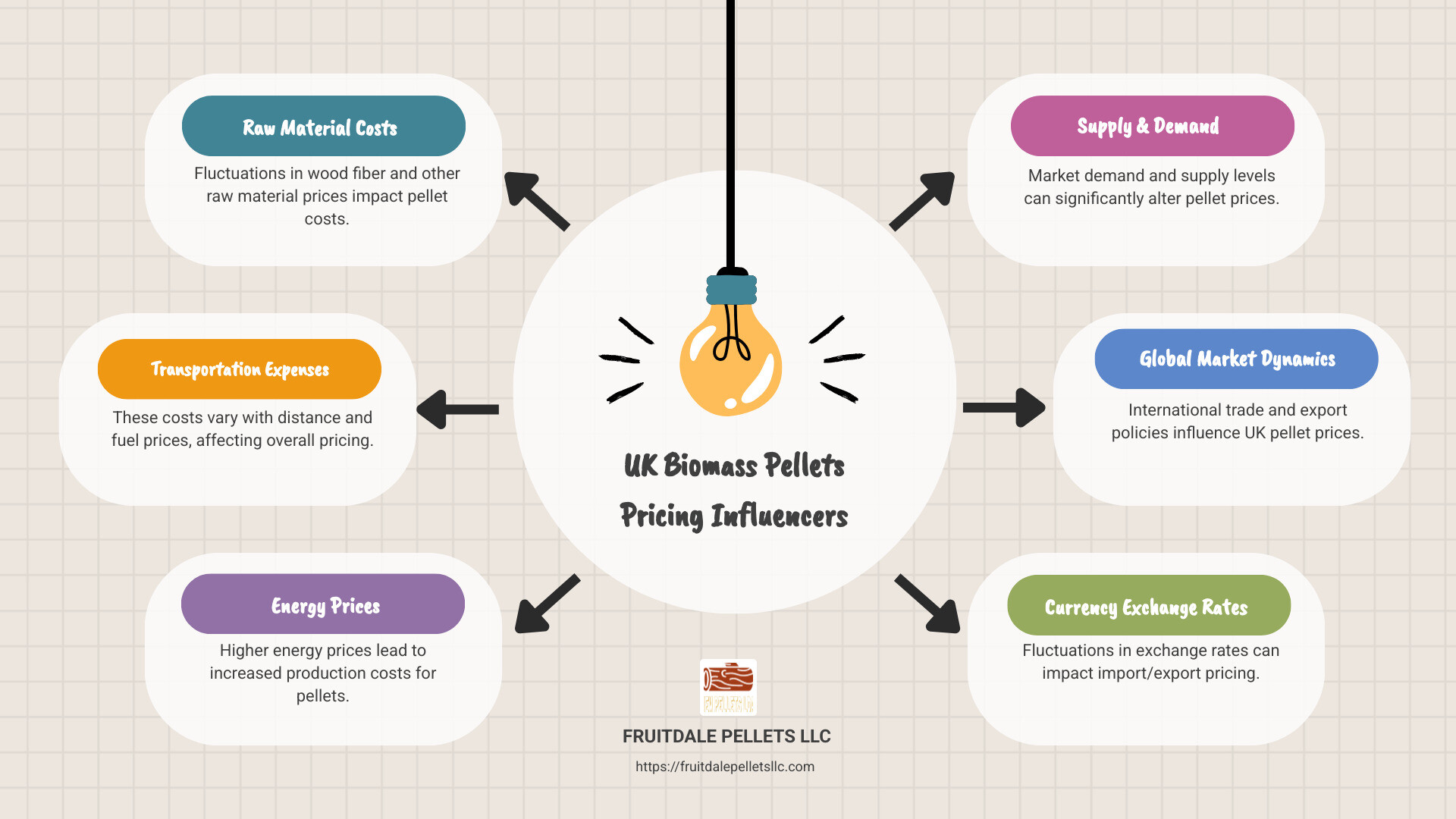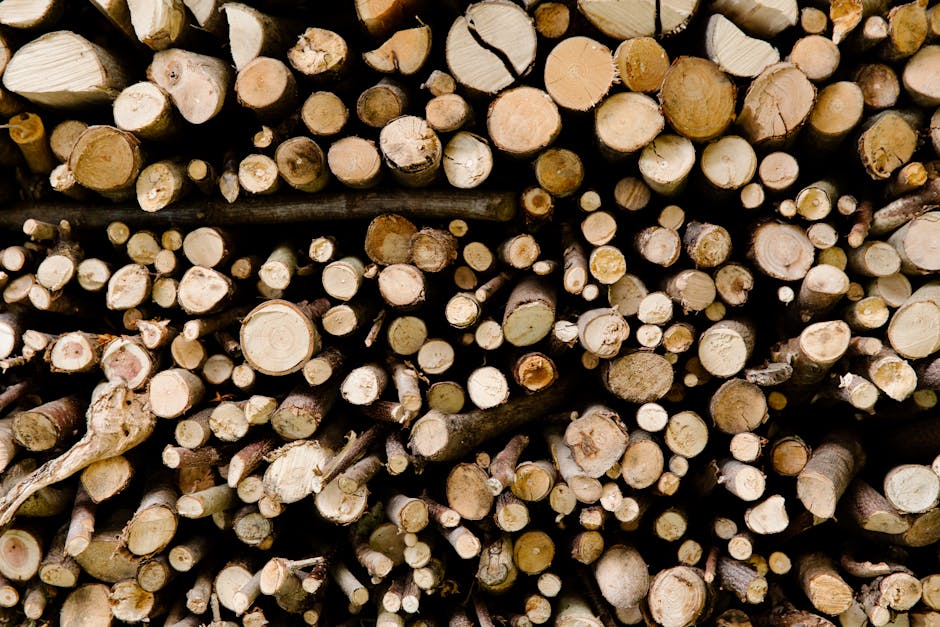Unpacking the Cost of Biomass Pellets in the UK
When looking into biomass pellets price per ton uk, many factors influence the numbers you’ll find. For now, the average cost of biomass pellets in the UK hovers around £250 to £300 per ton. These costs can vary due to several factors we’re going to unpack, but let’s start with a quick look at the basics.
Biomass pellets are becoming an essential part of the UK’s renewable energy strategy. As more industries and households turn to these sustainable fuel sources, understanding market trends and pricing becomes crucial. Prices are determined by various elements like supply and demand, availability of raw materials, and global market dynamics.
For construction project managers, knowing these trends is vital for managing budgets and timelines efficiently. Keeping an eye on UK pricing trends can help in making informed decisions, ensuring that project budgets are met without unnecessary hitches.

Biomass pellets price per ton uk helpful reading:
Understanding Biomass Pellets
Biomass pellets are a type of renewable energy source made primarily from compressed organic materials. In the UK, wood pellets are the most common form of biomass fuel. They are created by compressing sawdust and other wood waste into small, dense pellets. These pellets are then used as a clean and efficient heating solution for both residential and commercial purposes.
What Makes Wood Pellets a Popular Biomass Fuel?
Wood pellets are popular for several reasons:
- Sustainability: They are made from renewable resources, such as wood waste, which reduces reliance on fossil fuels.
- Efficiency: Wood pellets burn more efficiently than traditional wood logs, producing more heat with less waste.
- Convenience: Their uniform size and shape make them easy to store and transport.
Energy Efficiency of Biomass Pellets
One of the key advantages of biomass pellets is their energy efficiency. When compared to other biofuels, wood pellets have a higher energy density. This means they can produce more heat per unit of weight, making them an effective choice for heating.
Here’s a quick look at how wood pellets stack up against other fuels:
| Fuel Type | Energy Content (kWh/kg) |
|---|---|
| Wood Pellets | 4.7 – 5.2 |
| Wood Logs | 2.5 – 3.0 |
| Natural Gas | 12.0 – 13.0 |
Table: Energy content comparison of different fuel types.
This energy efficiency translates to lower heating costs and reduced environmental impact. For example, using wood pellets instead of coal or oil can significantly cut down on CO2 emissions, aligning with the UK’s push towards greener energy solutions.
Biomass Pellets in Everyday Use
For many UK households, switching to biomass pellets means more than just lower energy bills. It’s about contributing to a sustainable future. For instance, Emma Thompson, a homeowner in Yorkshire, switched to wood pellets after learning about their benefits. She found that not only did her heating costs decrease, but her family’s carbon footprint also shrank.

As the demand for cleaner energy grows, understanding the role of biomass pellets in the energy landscape becomes crucial. This knowledge helps individuals and businesses make informed choices about their energy consumption.
In the next section, we’ll dive deeper into the biomass pellets price per ton uk, looking at current prices and the factors that influence these costs.
Biomass Pellets Price Per Ton UK
When it comes to biomass pellets price per ton UK, several factors come into play. Let’s break down the current pricing, what influences these costs, and how market fluctuations impact the overall price.
Current Prices
As of the latest data, the price for a tonne of biomass pellets in the UK varies. Prices can fluctuate based on supply and demand, as well as other market conditions.
Cost Factors
Several key factors influence the price of biomass pellets:
- Raw Materials: The cost of raw materials, such as sawdust and other wood waste, plays a significant role. If the price of wood waste increases, so does the cost of pellets.
- Production Costs: Manufacturing processes, including drying and compressing the wood, require energy. Changes in energy prices can directly affect pellet production costs.
- Transportation: Shipping pellets from production sites to consumers involves logistics costs. Fuel prices and transportation distances can cause price variations.
Market Fluctuations
The biomass pellet market is subject to fluctuations due to various external factors:
- Seasonal Demand: Pellet prices often rise in winter when demand for heating increases. Conversely, prices may drop during warmer months.
- Policy Changes: Government policies promoting renewable energy can affect demand. For example, subsidies for biomass heating can increase demand and, consequently, prices.
- Global Events: International events, such as trade agreements or geopolitical tensions, can impact the supply chain, leading to price changes.
Understanding these elements helps consumers and businesses anticipate changes in the biomass pellet market. By keeping an eye on these factors, one can make more informed decisions about when to purchase pellets for optimal savings.
In the next section, we’ll dive deeper into the biomass pellets price per ton uk, looking at current prices and the factors that influence these costs.
Factors Influencing Pellet Prices
To understand the biomass pellets price per ton UK, look at the factors that influence these costs. Three major elements play a significant role: raw materials, transportation costs, and energy prices.
Raw Materials
The foundation of biomass pellets is raw materials like sawdust, wood chips, and other wood waste. The cost of these materials can vary based on availability and demand. If there’s a shortage of wood waste, prices for raw materials can spike, leading to higher pellet prices. Additionally, environmental regulations aimed at sustainable forestry practices can also impact the availability and cost of these materials.
Transportation Costs
Once pellets are produced, they need to be transported to where they’re needed. This involves logistics and shipping costs, which are directly influenced by fuel prices. If the cost of fuel rises, so does the cost of transporting pellets. Moreover, the distance between production sites and consumers can add to transportation costs. For instance, pellets produced in remote areas may be more expensive due to higher shipping fees.
Energy Prices
Energy is a crucial component in the production of biomass pellets. The process of drying and compressing wood waste into pellets consumes a significant amount of energy. Therefore, fluctuations in energy prices can impact production costs. For example, if electricity or natural gas prices increase, the cost of producing pellets will also rise. This makes energy prices a critical factor in determining the final price of biomass pellets.
Understanding these factors helps in navigating the complex landscape of pellet pricing. By keeping track of changes in raw material availability, transportation logistics, and energy costs, consumers and businesses can better anticipate shifts in the market.
Next, we will dig into how UK pellet prices compare with global trends, examining the import and export dynamics that contribute to price variations.
Comparing UK and Global Pellet Prices
When we talk about biomass pellets price per ton UK, it’s helpful to compare these prices with global figures. This comparison sheds light on the dynamics of the market and helps explain why prices might differ.
UK vs Global Prices
The UK market for biomass pellets is unique. Prices here are often shaped by local demand and supply conditions. In general, UK prices tend to be higher than in some other regions due to limited domestic production and higher transportation costs.
Globally, countries with abundant forest resources, like the United States and Canada, often have lower pellet prices. This is because they can produce and supply pellets more efficiently, reducing costs. In contrast, the UK imports a significant portion of its biomass pellets, which can increase costs due to import tariffs and shipping fees.
Import/Export Dynamics
The UK’s reliance on imports plays a critical role in its pellet pricing. Many of the pellets used in the UK are sourced from other European countries and North America. This dependency means that any changes in international shipping rates or currency exchange can impact prices.
For instance, if the value of the British pound drops, importing pellets becomes more expensive, driving up the price per ton. Additionally, geopolitical factors like trade agreements and tariffs can also influence costs.
Price Variations
Price variations are common in the biomass pellet market. Seasonal demand changes can cause fluctuations, as more people use pellets for heating in the winter months. During these times, prices might spike due to increased demand.
Moreover, global events, such as disruptions in supply chains or changes in environmental policies, can lead to price shifts. For example, stricter environmental regulations in exporting countries might increase production costs, which then get passed on to UK consumers.
Understanding these dynamics is crucial for anyone looking to purchase biomass pellets in the UK. By keeping an eye on global trends and local market conditions, consumers can make informed decisions about when and where to buy their pellets.
Next, let’s address some frequently asked questions about biomass pellets to further clarify the intricacies of this market.
Frequently Asked Questions about Biomass Pellets
How much is a tonne of biomass pellets?
In the UK, the biomass pellets price per ton can vary depending on several factors. As of recent data, a tonne of biomass pellets is priced at approximately £291.90. This figure is a baseline and can fluctuate based on market conditions, location, and supplier.
Why are pellets so expensive now?
Several factors contribute to the rising costs of biomass pellets:
- Wood Fiber Costs: The primary raw material for biomass pellets is wood fiber. When the cost of wood increases, so does the cost of pellets. Factors such as forest management practices, availability of wood, and environmental regulations can impact wood fiber prices.
- Production Costs: The process of turning wood into pellets involves energy-intensive machinery and skilled labor. Any increase in energy prices or wages can drive up production costs, which are then passed on to consumers.
- Transportation Costs: Moving pellets from the production site to the consumer also adds to the cost. Fuel prices, distance, and logistics efficiency all play a role in determining these costs.
How long will 1 ton of wood pellets last?
The duration that a ton of wood pellets will last depends on several factors:
- Usage Factors: The specific heating needs of a household will significantly impact how long a ton of pellets lasts. For example, a well-insulated home will require fewer pellets than a poorly insulated one.
- Efficiency: The efficiency of the pellet-burning appliance also plays a critical role. High-efficiency stoves or boilers will burn pellets more effectively, providing more heat per ton.
On average, a ton of wood pellets can last anywhere from 4 to 6 weeks for a typical household during the heating season, but this can vary based on the factors mentioned above.
Understanding these aspects can help consumers make informed decisions about their pellet purchases and usage.
Conclusion
At Fruitdale Pellets LLC, we are committed to providing high-quality biomass products that meet the diverse needs of our customers. Our experience in the wood industry since 2003 has allowed us to specialize in delivering internationally certified products with customized packaging and on-time delivery. This ensures that our customers receive not only the best pellets but also a seamless buying experience.
When it comes to the biomass pellets price per ton UK, understanding market trends and cost factors is crucial. Prices can fluctuate due to raw material costs, transportation, and energy prices. However, by staying informed about these dynamics, you can make more strategic decisions about your pellet purchases.
Our global presence in the USA, UK, EU, and Australia allows us to maintain competitive pricing and high standards. This is particularly important in the UK market, where import/export dynamics can influence price variations.
For those looking to invest in biomass pellets, consider the advantages of choosing a trusted supplier like Fruitdale Pellets LLC. Our dedication to quality and customer satisfaction makes us a reliable partner in your energy needs.
Explore our range of wood pellets and see how we can meet your specific requirements.


